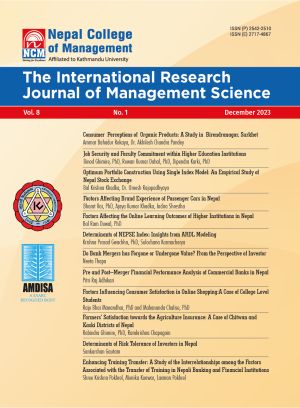Enhancing Training Transfer: A Study of the Interrelationships among the Factors Associated with the Transfer of Training in Nepali Banking and Financial Institutions
DOI:
https://doi.org/10.3126/irjms.v8i1.60710Keywords:
Job demand, Job resources, Motivation to transfer, Opportunity to transfer, Work engagement, Training transferAbstract
Purpose - The study examines the relationships of job demand, job resources, work engagement, motivation to transfer, and opportunity to transfer as key training-related workplace factors with training transfer and interrelationships among them in Nepali banking and financial institutions (BFIs).
Design/Methodology/Approach - This study applied a cross- sectional survey research design to collect responses from 250 bankers, consisting of a self-administered questionnaire. The respondents were selected using a purposive sampling method. Partial Least Square structural equation modeling (PLS-SEM) was applied to investigate the proposed model.
Findings - The findings highlight that motivation to transfer and opportunity to transfer have a significant relationship with training transfer. Job resources, job demand, and work engagement have an insignificant relationship with training transfer. Additionally, no significant association between job demand with motivation to transfer and opportunity to transfer was found. However, job resources have a positive relationship with motivation to transfer, opportunity to transfer, and work engagement. Similarly, work engagement is positively related to opportunity to transfer but has an insignificant relationship with motivation to transfer.
Originality/Value - The study presents the importance of training and effective training processes in the Nepali context, especially in BFIs. It reveals the essentiality of job characteristics and work engagement in the training process, which is crucial for organizational success.
Implications - The results are useful for managers and policymakers to focus on the transfer process to have a better implementation of training transfer. It helps to create a better learning culture in the organization which would be beneficial for employee development and organizational performance.




